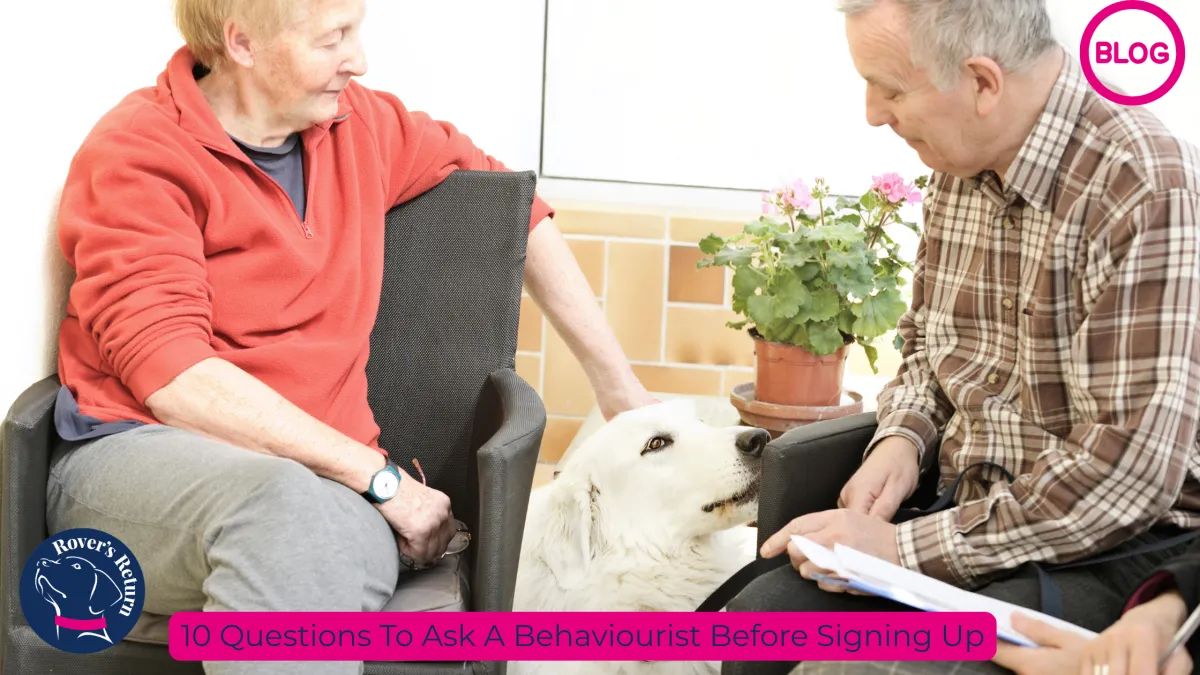
Ten Things To Ask A Dog Behaviourist Before Signing Up

Welcome to the Rovers Return Dog Training & Behaviour blog, your go-to trainer for learning about all things dog! I regularly discuss dog behavioural issues and behaviour modification.
With years of experience in dog training and behaviour modification, Passionate about helping dog owners build happy, harmonious relationships with their pets, Sam shares her expertise on all things canine behaviour. Follow her blog for expert tips, guides, and insights that truly make a difference.
This week's blog discusses what to ask a dog behaviourist before choosing to sign up.

When seeking help for your dog's behavioural issues, choosing the right professional is crucial.
In the UK, there are no regulations for dog training or dog behaviour. Anyone can claim to be a dog behaviourist with no qualifications or experience.
Choosing the wrong person can be costly, both financially and for your dogs' behaviour. Many behaviourists with little knowledge promote harmful methods, proven to increase aggressive behaviours.
A good dog behaviourist is not just a trainer; they are a specialist who can help you understand the root cause of a problem and create a humane and effective plan. To ensure you're working with the best person for your dog, it's essential to ask the right questions.
Here are ten key questions to ask a potential dog behaviourist before you hire them.
1. What Are Your Qualifications and Certifications in Dog Behaviour?
This is the most important question. Look for certifications from reputable, independent organisations that require rigorous testing and continued education. In the UK, this includes the ABTC, (Animal Behaviour and Training Council), APBC (Association of Pet Behaviour Counsellors) or CCAB (Certified Clinical Animal Behaviourist). These certifications show a commitment to ethical, science-based methods and professional standards.
The behaviourist should have a qualification with a RQF (regulated qualities framework) at least to a level 5.
Dog training qualifications and dog behaviour qualifications are different. Many dog trainers offer behaviour work with no training.
Be wary of certifications that can be purchased online with little to no training or examination.
2. What Is Your Dog Training Philosophy?
A modern, ethical behaviourist will use positive reinforcement and force-free methods. This means they focus on rewarding desired behaviours rather than punishing unwanted ones. Avoid anyone who suggests using aversive tools like slip leads, prong collars, shock collars, or who talks about "dominance" or "alpha theory." These methods are outdated and can be harmful to your dog's physical and psychological well-being.
I asked this question recently to a local trainer, and he told me he believes in the use of slip leads to ‘communicate with the dog’. I later found a dog with a prong collar on his social media.
3. How Do You Approach a New Behaviour Case?
A good behaviourist will start with a comprehensive assessment. This should involve a detailed history of your dog's behaviour, their health, and a thorough observation of their interactions with you and their environment.
They should not offer a quick fix over the phone, but instead should propose a structured process that begins with a consultation.
Without a full behaviour assessment, the success of changing your dog's behaviour is compromised.
4. How Long Will It Take To Change My Dog’s Behaviour?
Be sceptical of anyone who promises immediate results. True behaviour modification is a process that takes time, patience, and consistency. A qualified behaviourist will provide a realistic timeline, explaining that progress is often gradual and depends on the severity of the issue and your commitment to the plan.
5. Can You Provide a Written Behaviour Plan?
A professional should provide you with a written plan after the initial consultation. This document should outline the goals of the training, the methods to be used, and clear, step-by-step instructions. This shows their thoroughness and provides you with a valuable reference to follow.
6. Do You Work with My Veterinarian?
A good behaviourist knows that many behavioural issues can have an underlying medical cause. They should be willing to communicate with your vet to rule out any health problems. For severe anxiety or aggression, a collaborative approach with a vet is often necessary.
7. What Happens in a Typical Session?
Ask them to walk you through a typical session. It should involve a mix of discussion, observation, and hands-on guidance. They should be teaching you the skills to help your dog, empowering you to manage the behaviour on your own in the long run.
8. What Results Should I Expect?
While a behaviourist can't guarantee a specific outcome, or a timeline for change, they should be able to advise you on expected results for your dog. Avoid anyone promising results. Behaviour change takes time.
9. What Support Do You Offer After the Session?
Behaviour modification isn't just a one-off session. Ask about their behaviour programs, & follow-up support. Do they offer phone calls, email support, or additional sessions as needed? This ongoing guidance can be invaluable, especially if you encounter new challenges.
Avoid anyone offering single sessions. They should advise long term programs & regular support.
10. How Do You Handle Client Expectations and Relapses?
Behavioural issues can be complex, and setbacks can happen. A professional will be prepared to discuss this openly. They should have a plan for addressing a relapse and be able to help you manage your own frustration and expectations. This shows empathy and a realistic understanding of the process.
Asking these questions will help you find a qualified, ethical, and compassionate professional who will work with you and your dog to achieve a happier, more harmonious life together.
Rovers Return Dog Training & Behaviour is based in Leicestershire. Sam offers behaviour modification programs.
Sam is qualified to a level 6 and is certified in five different behaviour courses and has been working with dogs for ten years.
Sam encourages dog owners to book a call to discuss the behaviour and what type of training is needed to help you achieve your goals .